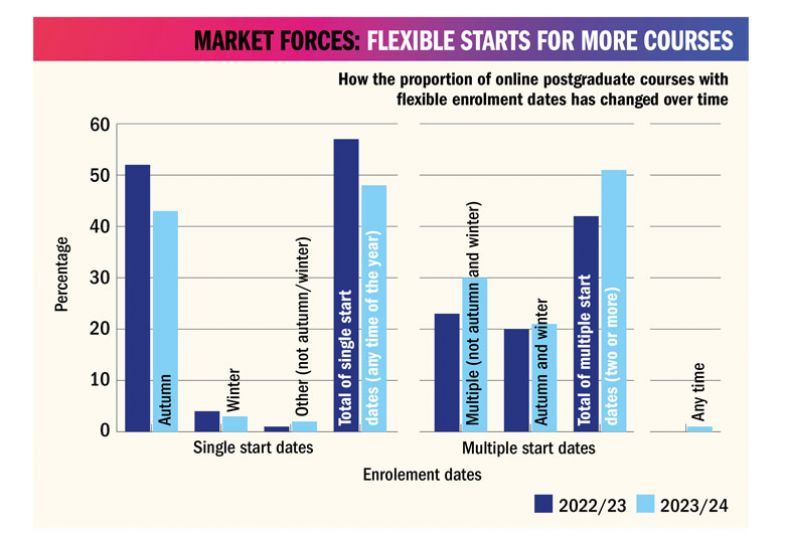Distance learning postgraduate degrees are becoming increasingly flexible in UK universities.
Analysis of The Knowledge Partnership (TKP)’s Courses 360 database shows that the number of online learning postgraduate courses has been increasing for many years.
There appears to be a move towards more flexibility, with 51 per cent of distance courses recorded in the 2023-24 database having two or more start dates – up from 42 per cent in 2022-23.
Just 48 per cent are recorded as having a single start date in autumn 2023, compared with 57 per cent a year previously.

The data includes alternative (non-public) providers that have consistently been included in the database, and all credit-bearing postgraduate taught programmes of 60 or more credits.
Simple economics is behind these trends, according to Simon Thompson, director of flexible learning at the University of Manchester. Costs are going up, but undergraduate student fees are not.
Universities have to absorb costs, which have gone up by roughly a quarter, so they might be looking to expand distance postgraduate learning to recruit more students and balance their books, he added.
Professor Thompson said more distance learning courses at a university might reflect it trying to keep up with the competition, seeking to be more globally outward-facing, or aligning with a desire to be more sustainable and reduce the need for overseas travel.
“Finally, there is a recognition that the nature of student learning is changing, that not all learners want or can access on-campus learning and so having high-quality online offerings – particularly at postgraduate [level] – works well for students who want more flexibility,” he added.
The figures show that, alongside the Open University, pre-92 institutions continue to account for about half of all distance courses.
Professor Thompson, who was formerly director of the Centre for Innovation in Education at the University of Liverpool, predicted a significant increase in online courses in the short to medium term, but warned that a saturation point was coming.
“Remembering that scaling up online learning is logistically easier than scaling up on-campus learning, the winners in this area will be those who are able to market their offering really well and ultimately provide a high-quality experience which continues to attract learners,” he said.
The most popular subject areas for postgraduate distance courses for 2023-24 are education, law, and business and management, according to the Courses 360 data.
The figures are good news for students who will have significantly more choice in their studies, according to Professor Thompson – and will allow universities to reach a more diverse range of learners.
Although this transition might be challenging for some academics, there is enough expertise in the sector to support staff, he added.
“We mustn’t forget that there is now a growing number of academic staff who are comfortable and capable of working in a mixed-modal higher education teaching environment and this will only increase as the expansion of online and blended portfolios continues and more opportunities to teach in these spaces present themselves.”




